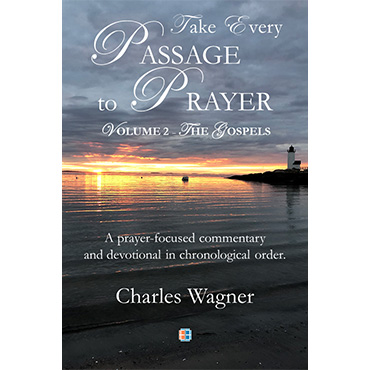The Gramazin Blog

Jesus Calls Matthew, Teaching About Fasting
Take Every Passage to Prayer - Volume 2, The Gospels
Saturday June 22, 2024
Matthew 9:9-17, Mark 2:13-22, Luke 5:27-39
Father, please help me not to judge others by their lifestyle or appearance. It is Your place to judge them, not mine. Give me a heart that welcomes everyone to the gospel of Jesus Christ. No, give me something even more – a heart that goes to dine with those who need the gospel of Jesus Christ. Father, please give me a heart that celebrates Jesus Christ; who He is and what He has done for us all. I don’t want to be gloomy or despondent. I don’t want to be sad or pessimistic. That’s who I was in the past. I want to have a new heart and a new life of joy that others want for themselves. Father, I want the measure of my walk with Christ to be the lives He has touched through me and the hearts that have been filled with hope and joy because He used me. I don’t want to be known as a religious man who kept his joy and peace to himself. Amen.
Father, the passage tells us that Jesus went out and saw a tax collector named Matthew (Levi) sitting at his tax booth.
Two questions come to mind from this text:
- The lack of detail about what happened after Jesus had healed the paralyzed man and he had walked out. Did Jesus resume healing? Did the people plead for healing with all the more intensity? Did Jesus preach more about forgiveness of sins? Did the humiliated Pharisees and teachers of the law get up and leave? Did Jesus send everyone home? Did Jesus help repair the roof? Did others, perhaps the disciples, help repair the roof for Jesus? We can only conjecture.
- Why was the tax collector sitting at his booth? Why wasn’t he in the crowd watching Jesus heal people? Why wasn’t he listening to Jesus preach? Had he returned to his booth after the crowd had dispersed? Was his tax booth always at this location or had he moved the booth to take advantage of the crowd? If this was Jesus home, and the tax collector’s booth was outside, did Jesus move into a home on a busy city street for the purpose of connecting with people?
Father, I suspect that Matthew and Jesus already had numerous conversations because Matthew’s tax booth was so close to Jesus’ house. I suspect that Jesus had already invited Matthew to follow Him, but Matthew needed a little more evidence. I suspect that the healing of the paralyzed man was the convincing evidence that Matthew needed. He was able conclude that Jesus was the Messiah and the Son of God. He gave up all of his income generation to follow Jesus around the region. I also suspect I could be wrong; perhaps Jesus’ invitation overwhelmed Matthew in an instant and he gave up his career to follow Jesus.
As the two walked, Matthew decided to hold a “great banquet” for Jesus at his house (Luke 5:29). Matthew, who has concluded that Jesus is the Son of God, the long-awaited Messiah, wanted to celebrate who Jesus was. Matthew may have also wanted to celebrate his own new life in Christ as a follower of Jesus. However, the exciting thing that may be going on here is that Matthew was being an evangelist. He was missional. He wanted his friends, who were tax collectors like himself and “sinners”, to come and meet Jesus and encounter the Savior for themselves. Matthew loved his friends and wanted to share the living and breathing Gospel with them. Jesus knew full well who was going to be eating with Him, and why Matthew had invited them, and He did not shy away from the opportunity to share the good news with the social outcasts of Capernaum society.
The text suggests that the dining area was in proximity to a public thoroughfare, enabling the Pharisees and teachers of the law to see those gathered around the table. I can imagine the food was on a serving table not far from the street. A disciple or two got up to get more food and the Pharisees asked him why Jesus was eating with tax collectors and sinners.
Jesus overheard and spoke up from the table:
“It is not the healthy who need a doctor, but the sick. But go and learn what this means: ‘I desire mercy, not sacrifice.’ (Hosea 6:6) For I have not come to call the righteous, but sinners to repentance (NIV).”
In 21st century America, Jesus would sit down for dinner with gang members, drug dealers, child molesters, pornographers, rapists, terrorists, human traffickers, and murderers. He would do so to rescue them from their godless lifestyle and to lead them to repentance. Jesus’ intention would be none other than to radically transform the hearts of these wicked men, that they might live in obedience to God’s commands from that point forward. Jesus sees past the sin and sees the vulnerable and needy sinner deep inside who is in dire need of the love and forgiveness of God.
The text does not tell us whether any of these men were saved that night. However, it seems quite reasonable to believe that at least one of the men, touched by Matthew’s own testimony and by breaking bread with the Son of God, encountering Him in conversation, would come away as a different man altogether. Ask Saul of Tarsus (Acts 9).
While this is going on, John the Baptist remains in prison for having criticized the marriage of Herod Antipas and Herodias (Luke 3:19-20). His leaderless disciples may have continued with John’s mission to call people to repentance. We learned in John 3:23-36 that his disciples had expressed to John their concern that Jesus was becoming more popular than John. In this passage, they show up at the scene in Capernaum and appear to still be in competition with Jesus.
“How is it that we and the Pharisees fast often, but your disciples do not fast? (NIV)”
In other words, “we are doing the right thing. How come You and your disciples are not?”
There are at least six purposes for fasting as described in passages in the Old Testament.
- Mourning. There was fasting when Saul and his son’s bodies were recovered. (1 Samuel 31, 1 Chronicles 10). David and his men fasted when they heard of the death of Saul and Jonathan. (2 Samuel 1). Nehemiah also mourned and fasted when he saw the walls of Jerusalem were destroyed (Nehemiah 1). See also Psalm 69:9-11).
- Pleading to God. David fasted in an attempt to prevent the death of the baby he had with Bathsheba (2 Samuel 12). Haman had orchestrated King Xerxes extermination of the Jews. Mordecai called for a fast among the Jews. Esther called for a fast when she promised to persuade the king to change his mind. (Esther 3-4, 9). See also Psalm 35:13, Psalm 109, Daniel 9, Joel 1.
- Remorse. Ahab fasted after Elijah called him out for his idolatry (1 Kings 21). The people of Nineveh fasted after they responded to Jonah’s preaching and repented (Jonah 3).
- Seeking Guidance. Jehoshaphat demanded all Judah fast to seek guidance from God (2 Chronicles 20).
- Requesting God’s blessing. Ezra called for a fast that God might grant them a safe journey (Ezra 8).
- Reading of God’s Word. Jeremiah instructs Baruch to fast and read the Word of God to the people of Judah. (Jeremiah 36).
However, each one of these reasons for fasting became unnecessary because John’s disciples were in the very presence of the Son of God.
- Mourning - But Jesus, the Son of God, is right here! He has come to save the world from sin! Celebrate!
- Pleading to God - But Jesus, the Son of God, is right here. Talk with Him!
- Remorse - But Jesus is right here! He forgives sin! He washes sins away! Celebrate!
- Seeking guidance - But Jesus is right here! He has the wisdom of God!
- Requesting God's blessing - But Jesus is right here! He does miracles.
- Reading God's Word - But Jesus is right here! He is the Word of God (John 1).
Father, the question asked by John’s disciples reveals that they did not believe they were in the presence of God. What do people do when they are in the presence of God? They worship Him. They praise Him. They joyfully thank Him for salvation. They celebrate their new life in Christ. Being with Jesus is not the time for somber gloom; it is the time for a banquet, the kind of joy that is expected at a wedding(Revelation 19:1-9). These tax collectors and “sinners” understood what it meant to celebrate being in the presence of Jesus. It is time for the joy and peace that come through the Holy Spirit (Galatians 5:22-23).
Jesus answered, “How can the guests of the bridegroom mourn while he is with them? The time will come when the bridegroom will be taken from them (Acts 1:9-11); then they will fast. (NIV)”
Jesus encouraged John’s disciples in this passage to embrace a new life in Christ. It is a life of joy and peace knowing that they are forgiven of their sins through Him. They are to put the old life behind them, the life of trying to please God by their good behavior or their religious acts, such as fasting. The new life and the old life don’t work together. They can’t be living with joy in the freedom Christ gives them while at the same time they are chained to trying to please God by doing good works through the law. Their walk with Christ is not about the things they do but the Savior they have a fellowship with, such as at a banquet table.
Father, there are many believers who see their Christian walk on a purely vertical plane. All that matters to them is how they relate with Jesus in the privacy of their thoughts and in the privacy of their homes. “As long as I have my devotions and prayer time, and I stay away from scandalous behavior, Jesus is pleased with my Christian life.”
However, Jesus taught us that all of the law and prophets can be summed up in two commands: to love God with all our heart, soul, and mind, and to love our neighbors as ourselves (Mark 12:29-31). Fasting, when motivated by godliness, is about the first commandment. However, it is the second commandment that brings the good news of Jesus Christ, the reason to celebrate, to others.
While fasting shows our love for You, loving others in Your name shows it all the more. You want us sharing the love of Christ with others (mercy) more than You want us to fast (sacrifice) (Hosea 6:6).
In fact, Isaiah 58 and Jeremiah 14:9-10 tells us that true fasting is to live our lives in a way that pleases God.
|
Jesus would have been far more blessed by John’s disciples if they had pulled up a chair and joined the tax collectors and sinners at the table. It is time for a new life in Christ. Amen.
Capernaum was located in territory governed by Rome. Rome required the citizens to pay a high tax, the revenues of which enabled the empire to afford the costs of dominating so many nations in the Mediterranean region. Prominent Jews would lobby for the official position of tax collector. Why? A tax collector could charge his own fees on top of the taxes that had to be paid. There was no limit to what fees a tax collector could charge in addition to the taxes due. This contributed to the public despising tax collectors, considering them as we might consider the mob in modern times. Matthew was also a publican, who collected tolls for travel and fees associated with business transactions. Tax collectors were ostracized from society and any who befriended them were under suspicion.
Matthew refers to himself as Matthew. Mark and Luke refer to him as Levi. The first Levi in the Bible was the third son of Jacob and Leah (Genesis 29:34), the namesake for the tribe of priests that were called to serve in the tabernacle. Moses was from the tribe of Levi. Surprisingly, Matthew is mentioned only six times in the New Testament. The first two mentions of him are in this passage. The other four mentions of him are when he is included in a list of disciples (Matthew 10:3, Mark 3:18, Luke 6:15, Acts 1:13). Matthew is believed to be the author of the Gospel of Matthew because of the author’s familiarity with and focus upon Judaism, his references to money, the determination of his authorship by leaders in the early church, and his command of the Greek language that he used for business.
Mark 2:13 describes Levi’s encounter with Jesus on the shores of the lake (Sea of Galilee) and after Jesus had taught a crowd of people. Technically speaking, Capernaum is near the lake and Jesus did teach a crowd (Mark 2:2) when he healed the paralytic. Mark, therefore, agrees with Matthew and Luke that Matthew was called after the healing of the paralyzed man when Jesus taught the crowd.
The Greek word for sinners is ?????????. According to the Blue Letter Bible, this word is used to describe people devoted to sin; wicked people; criminals; heathen.
Jesus drove home the point of separating the new from the old by using the metaphors of old garments and new cloth and new wine and old wineskins. The typical wineskin of the day was made of goatskin. It was more flexible and lasted longer. The skin is removed from the goat and tanned. It is then coated with pitch to make it waterproof. A nozzle is added for pouring and drinking. The first filling of wine is discarded after five days before drinkable wine is poured into it.







